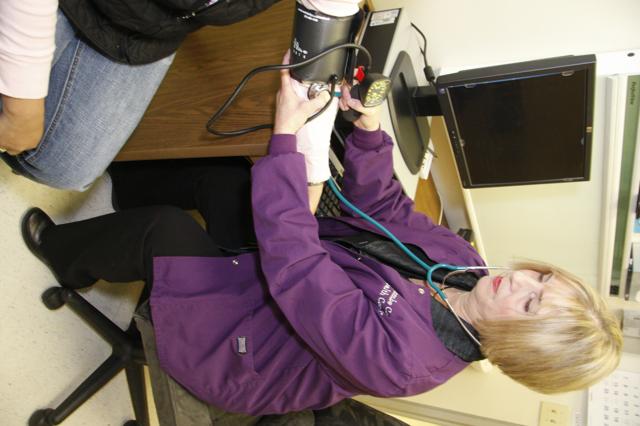- Fiscal health: The county faces an uncertain budget situation, and may privatize more services to deal with it. Its health clinic services were taken over by the nonprofit WNC Community Health Services in 2010. photos by Jonathan Welch
- Going mobile: Mountain Mobility buses. The county is looking to privatize the service as part of cost-cutting measures to deal with a budget situation Chair David Gantt describes as “the worst I’ve seen since I’ve been on the board.”
Home to nearly a quarter of a million people, Buncombe County ranks among the state's most populous. Its Board of Commissioners and staff oversee a sizable school system, the Sheriff's Office, the courts and extensive social services.
In a previous analysis, Xpress considered the city of Asheville’s fiscal challenges, assessing the likelihood of various options for balancing the budget (see “Hard Rocks, Few Places,” Feb. 16). We now turn a similar spotlight on the county's financial challenges and potential paths out of the woods.
Last year, Buncombe County's budget process was much lower-key than the city's. The commissioners merely approved a staff-proposed plan to tap the county’s reserve funds to close the budget gap.
This year, however, the volatile state budget situation poses additional challenges, as nearly a quarter of Buncombe’s roughly $252 million budget relies on either direct state funding or things like sales-tax revenues that originate here but are subject to delayed payment or outright withholding by the state.
“It's the worst time I've seen since I've been on the [Board of Commissioners],” board Chair David Gantt reports. “It's going to be hard. There's going to be some pain; people are going to tell that we are in bad financial shape. We just hope there's an upturn in the economy and in property values, and things get back on track.”
The contrasting dynamics of the two local governments also play a role. Asheville City Council meetings tend to be longer, with individual members (who often differ widely in their philosophies and approaches to budget challenges) repeatedly questioning staff or trying to modify proposals.
The Buncombe County commissioners, on the other hand, typically focus on setting budget priorities, keeping their questions concerning staff proposals short and mostly confining their comments to praise for staff’s work; budget votes are usually unanimous. It's fair to say that Wanda Greene, the county manager since 1997, generally has to run the gantlet less than her counterpart, City Manager Gary Jackson. Greene’s budget recommendations almost always seem to end up becoming law.
The state of things
While the city is also facing budget curve balls from the state, due to the nature of the services the county is required to provide, it’s far more vulnerable to fiscal decisions in Raleigh. Fully 22 to 23 percent of the county's revenue is parceled out by the state. State legislators, Greene reports, have said they “won't balance the budget on the backs of local governments,” but the county is nonetheless bracing for significant fiscal impact, and the state may well end up shifting services to the counties while providing little compensation, she notes.
“We're expecting some fallouts,” Greene reveals. Gantt sounds a similar note, mentioning that the some in Raleigh have even suggested shifting state road maintenance to counties.
The county also oversees a large social-services apparatus whose expenses have soared since the economic downturn hit. Food-stamp expenditures, Greene estimates, have roughly tripled since 2008, from $1 million to $3 million per month.
There are many expenses over which the county has little control. Even amid a budget crunch, the commissioners can't decline to open a new school, for example, or provide food stamps to those who are eligible. Similarly, the courts must continue to operate (and they can even force the county to provide them with more space, if necessary).
“We have some new expenses we've got to absorb,” Greene explains. “We're opening two intermediate schools in September. … We have an increasing caseload in human services, and with health-care reform, we expect the number of Medicaid enrollees to increase by 60,000 to 70,000 people, and we have to determine eligibility. We have to take those new costs.”
So while Buncombe has more resources than the municipalities that sit within its borders, the county has less flexibility during tight times, due to the number of untouchable items falling under its budgetary umbrella and its greater vulnerability to events in Raleigh.
“Some of us aren't sleeping nights, waiting for what they're going to do,” Greene reveals. “At least we're hearing that they're going to move fast. But as a county, we're really an arm of the state. If they transfer 1 percent of a service cost to us, it doesn't sound like a lot, but it can become hundreds of thousands of dollars really fast.”
Meanwhile, county revenues, like the city's, remain flat, and Greene says she expects “very little new growth. Construction is still not growing; sales taxes are not rebounding.”
Spending cuts
“Our departments are bringing in a proposal for 10 percent cuts — and we have the full expectation we'll implement that,” Greene reports. “The guiding principles that I'm using are that if we provide the same level of service, we have to do it at a lower cost.”
County salaries have been sharply criticized recently, starting with the commissioners’ own compensation. The newly retired Otto DeBruhl ranked among the highest-paid registers of deeds in the state, with one of the largest, highest-paid staffs. This fiscal year, notes Greene, a third-party assessment will compare Buncombe's compensation levels with those in other N.C. counties, and reductions may follow if needed.
But the priority, she emphasizes, is on “overall reduction in work-force costs” rather than cutting salaries to the point where turnover becomes a serious concern. Avoiding layoffs is also a major priority.
However, and Gantt says he doesn’t support reducing staff salaries, noting, “We don't need to penalize people because the budget's bad.”
He adds: “We don't want to cut education; that's been a priority from the [commissioners’] retreat on. But we're kind of hostage to the state on matters like the sales tax and picking up additional services.”
Look for most cuts to hit vacant positions, overtime, training and what Greene dubs “nice things,” such as the annual fireworks display at Lake Julian (which costs the county $40,000 a year).
How likely is it?
All but certain. Whenever Greene has asked county departments for cuts, they've been implemented. This remains one of the county's favored ways to balance the budget.
Privatization
Greene has also highlighted privatizing some county services as “a way to increase our capacity at the existing cost.” In theory, however, the term can mean anything from hiring an outside contractor to selling public assets outright.
One possible model for county privatization is the 2009 turnover of Buncombe's clinics to Western North Carolina Community Health Services, whose federal status gives it a better Medicare/Medicaid reimbursement rate, enabling the agency to see more patients for the same local cost. Last fiscal year, the county paid the nonprofit $2.3 million to provide clinic services, and most county health workers kept their jobs. “To the extent that we can, when we privatize something, we want the employees to move [over to the new agency],” Greene explains. “The idea is that you won't see a change in services — just in who's providing them.”
Gantt says "Everything's up for grabs" when it comes to privatization; contracts, he stresses, will ensure that current service levels are maintained.
Some forms of privatization also raise concerns about transparency and whether basic needs are being met. So far, the transfer to WNC Community Health Services has mostly escaped significant public backlash.
In January, Buncombe County began accepting proposals to privatize Mountain Mobility, whose 37 vans and five buses serve more than 500 mostly elderly and low-income passengers on an average day. Transit advocates fear the move could hamper efforts at regional coordination.
How likely is it?
Almost a certainty, though the scale could vary considerably. The main challenge is finding private partners with the expertise and resources to run a countywide operation — particularly in the current economy.
But the commissioners and county staff alike have shown a fondness for public/private partnerships, beginning with the health-clinic transfer. Given that level of support, some privatization seems pretty likely.
Raising taxes
Another way the county could balance its budget is by boosting revenues. The commissioners have remained adamantly opposed to tax increases, but that doesn't tell the whole story.
Technically, Buncombe County lowered its property-tax rate after the last revaluation, to 0.525 cents for every $100 of property value. But that was in 2005, when the rising value of most homes meant the average homeowner still wound up paying more. And some critics said the county's 2009 decision to postpone the scheduled property revaluation amounted to a de facto tax increase, since the current values had been set amid a real estate boom.
“No one on the board is advocating a tax increase,” says Gantt. “People just can't afford it, and people can't afford a revaluation, because, despite popular belief, I think a lot of people would find their properties have gone up slightly — just not to the extent that they had in the past.”
How likely is it?
Not very. The commissioners are known for their declared dislike of tax increases, and none of them has seriously broached the topic during their public deliberations. Greene, meanwhile, says the message to staff is “crystal clear”: balance the budget without a tax increase.
Rainy-day funds
Asheville began dipping into its reserve funds several years ago, and by last year, the fund balance was already lower than what both Council members and staff considered acceptable, so using that money to balance the budget wasn't seen as a viable option — then or now.
The county, still has a significant cushion, to the tune of $50.9 million (about 20 percent of the current total budget). Last year, the county apparently decided that times were rainy enough to justify using those funds to preserve current service levels. Such an option may prove equally appealing this year, particularly given the uncertain situation in Raleigh.
Although the projected deficit has shrunk, a multibillion-dollar shortfall remains, and the Republican-dominated General Assembly, committed to addressing it solely via spending cuts, is considering handing off an array of major expenses to local governments.
How likely is it?
Very likely, though the amount of the drawdown will depend on how things play out in Raleigh. “We will do that again,” Greene reports. “We're sitting here planning now for July or June: A lot can change in that time. We try not to have to spend any fund balance, but we'll certainly appropriate some.”
Fallout
With the county’s path seemingly more set than the city’s, some combination of privatization, spending cuts and reserve funds is the probable solution to Buncombe’s budget troubles.
But each of those options may have far-reaching ramifications for the thousands of lives county services affect, from people in the outlying rural areas to those living in downtown Asheville. And as with the city, now is the time for county residents concerned about the best way to balance the budget to make their feelings known.
— David Forbes can be reached at 251-1333, ext. 137, or at dforbes@mountainx.com.






I know the author of this article did not design this weeks MX cover, but this is the article linked to the photo.
This cover seems to make light of nuclear fallout and I find it to be in incredibly bad taste. It is ill-timed and makes me wonder how aware of global events MX editors are that they wouldn’t make the choice to replace the cover in light of recent events.